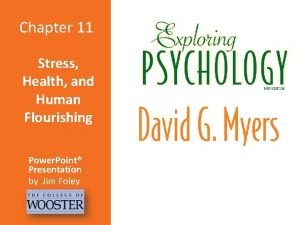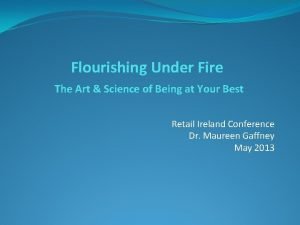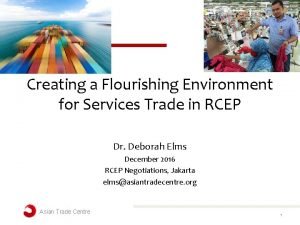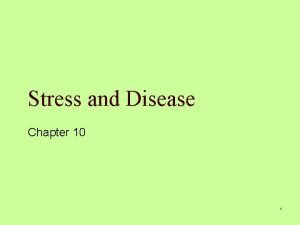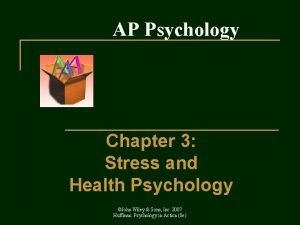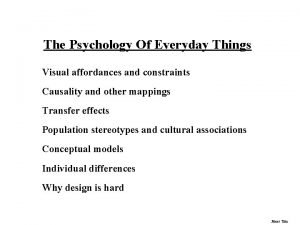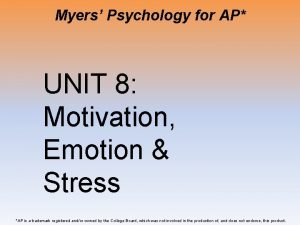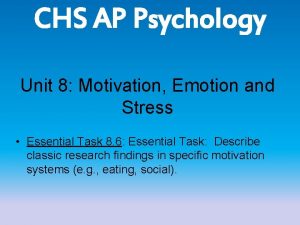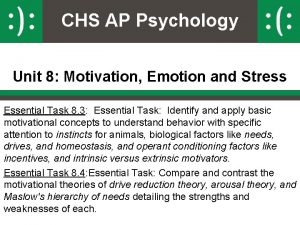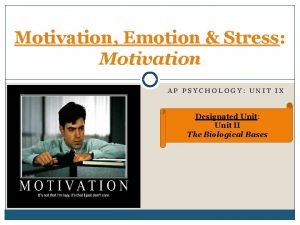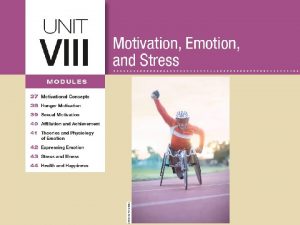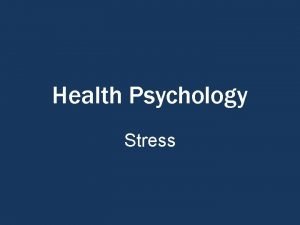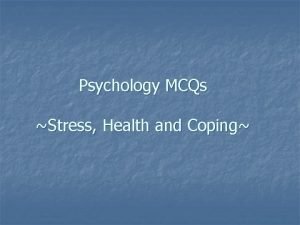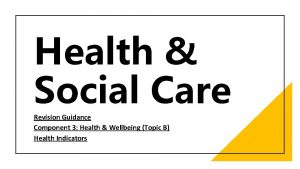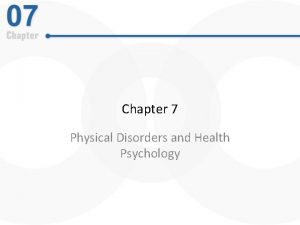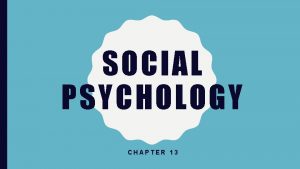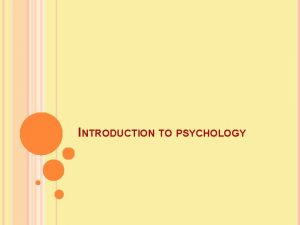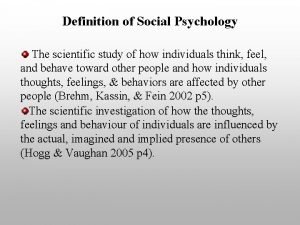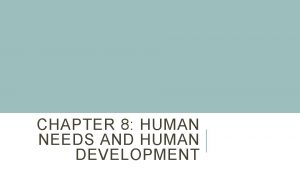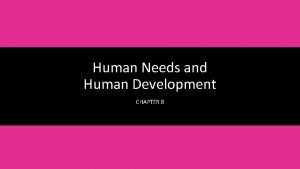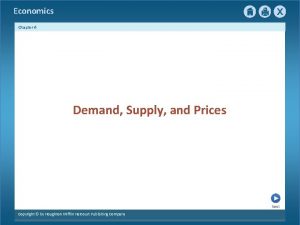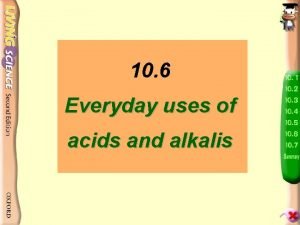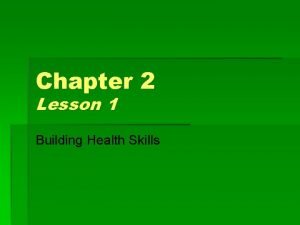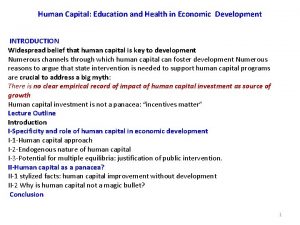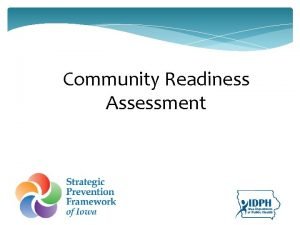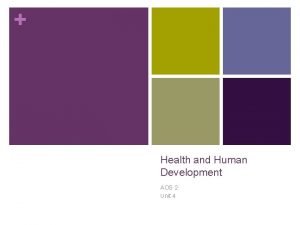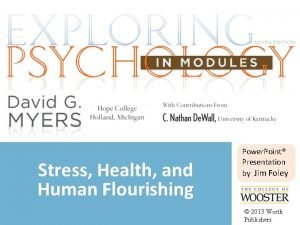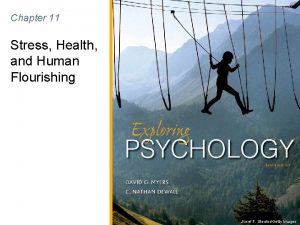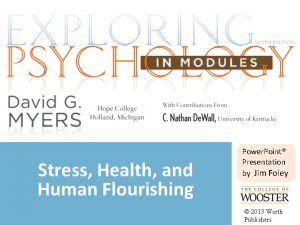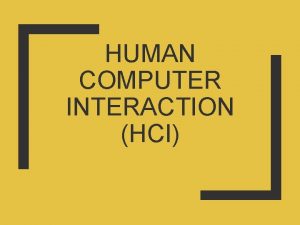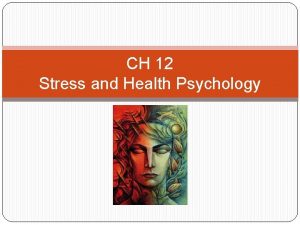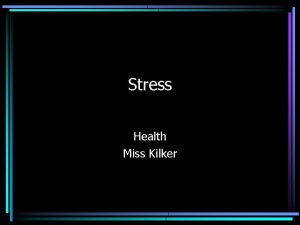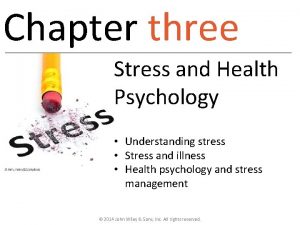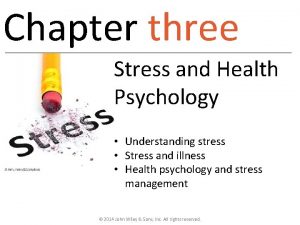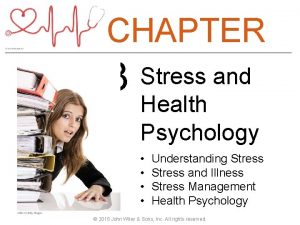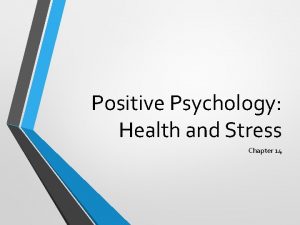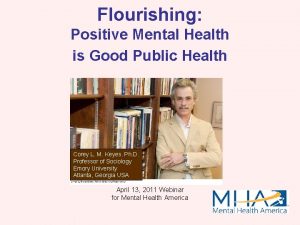Stress Health and Human Flourishing Psychology in Everyday













































- Slides: 45

Stress, Health, and Human Flourishing Psychology in Everyday Life Copyright © 2020 by Macmillan Learning. All Rights Reserved Chapter 10 David G. Myers • C. Nathan De. Wall | Fifth

Chapter Overview Stress: some basic concepts Stress effects and health Coping with stress Managing stress effects Happiness Psychology in Everyday Life Copyright © 2020 by Macmillan Learning. All Rights Reserved • • • David G. Myers • C. Nathan De. Wall | Fifth

Stress: Some Basic Concepts • Stress • Process of appraising an event as threatening or challenging, and responding to it • Stressors • Stress reactions • From alarm to exhaustion: physical and emotional responses Psychology in Everyday Life David G. Myers • C. Nathan De. Wall | Fifth Copyright © 2020 by Macmillan Learning. All Rights Reserved • Things that push our buttons; a challenge or event

Stress Appraisal Copyright © 2020 by Macmillan Learning. All Rights Reserved • The events of our lives flow through a psychological filter. • How we appraise an event influences how much stress we experience and how effectively we respond. Insert Figure 10. 1 here Psychology in Everyday Life David G. Myers • C. Nathan De. Wall | Fifth

Stressors Copyright © 2020 by Macmillan Learning. All Rights Reserved • Catastrophes • Significant life changes • Daily hassles Psychology in Everyday Life David G. Myers • C. Nathan De. Wall | Fifth

Stress Reactions: From Alarm to Exhaustion • Cannon’s findings • The sympathetic nervous system responds to the body’s alarm to stress. • Prepares the body for the fight-or-flight response • The body’s adaptive response to stress is general. • Response was named the general adaptation syndrome (GAS) Psychology in Everyday Life David G. Myers • C. Nathan De. Wall | Fifth Copyright © 2020 by Macmillan Learning. All Rights Reserved • Selye’s findings

Copyright © 2020 by Macmillan Learning. All Rights Reserved Selye’s General Adaptation Syndrome Psychology in Everyday Life David G. Myers • C. Nathan De. Wall | Fifth

Tend-and-Befriend Response • People often provide support to others. Copyright © 2020 by Macmillan Learning. All Rights Reserved • They bond with and seek support from others. Psychology in Everyday Life David G. Myers • C. Nathan De. Wall | Fifth

Stress Effects and Health Copyright © 2020 by Macmillan Learning. All Rights Reserved • Stress and cancer • Stress and heart disease • Thinking critically about stress and health Psychology in Everyday Life David G. Myers • C. Nathan De. Wall | Fifth

Psychoneuroimmunology • Study of how a person’s immune system and health are affected by the combination of: • Emotions affect the brain, which controls the endocrine hormones, which influence the immune system. Psychology in Everyday Life David G. Myers • C. Nathan De. Wall | Fifth Copyright © 2020 by Macmillan Learning. All Rights Reserved • Psychological processes • Neural processes • Endocrine processes

Immune System • If it responds strongly: May attack the body’s own tissues • If it under-reacts: May allow infection, suppress immune system • Slower wound healing, cold development, faster disease course Psychology in Everyday Life David G. Myers • C. Nathan De. Wall | Fifth Copyright © 2020 by Macmillan Learning. All Rights Reserved • Affected by age, nutrition, genetics, body temperature, and stress • Results of a dysfunctional immune system

Copyright © 2020 by Macmillan Learning. All Rights Reserved A Simplified View of Immune Responses Psychology in Everyday Life David G. Myers • C. Nathan De. Wall | Fifth

Stress Effects and Cancer • Stress and cancer Copyright © 2020 by Macmillan Learning. All Rights Reserved • Stress does not create cancer cells, but it affects their growth by weakening natural defenses. • Research on the link between stress and cancer shows mixed results. Psychology in Everyday Life David G. Myers • C. Nathan De. Wall | Fifth

Stress and Heart Disease (part 1) • Coronary heart disease: Clogging of the vessels that nourish the heart muscle • Stress can cause the generation of inflammation, which is associated with heart and other health problems. Psychology in Everyday Life David G. Myers • C. Nathan De. Wall | Fifth Copyright © 2020 by Macmillan Learning. All Rights Reserved • Leading cause of death in the United States and other countries

Stress and Heart Disease (part 2) • Friedman and Rosenman’s research • People who react with anger over little things are the most prone to coronary problems. Psychology in Everyday Life David G. Myers • C. Nathan De. Wall | Fifth Copyright © 2020 by Macmillan Learning. All Rights Reserved • Type A: Competitive, hard-driving, impatient, verbally aggressive, and anger-prone people • Type B: Easygoing and relaxed people

Effects of Pessimism and Depression Psychology in Everyday Life Copyright © 2020 by Macmillan Learning. All Rights Reserved • Pessimism increases the risk for heart attack. • Depression poses a serious risk for heart disease. David G. Myers • C. Nathan De. Wall | Fifth

Ways to Cope with Stress • Problem-focused coping • Attempting to reduce stress directly • Involves changing the stressor or the way one interacts with that stressor • Attempting to reduce stress by: • Avoiding or ignoring a stressor • Attending to emotional needs related to the stress reaction Psychology in Everyday Life David G. Myers • C. Nathan De. Wall | Fifth Copyright © 2020 by Macmillan Learning. All Rights Reserved • Emotion-focused coping

Thinking Critically About Stress and Health • Stress and health • Stress makes people vulnerable to illness. • Anger or depression, persistent stressors, and unhealthy behaviors trigger the release of stress hormones. • Leads to headaches, high blood pressure, inflammation, immune suppression, and heart disease Psychology in Everyday Life David G. Myers • C. Nathan De. Wall | Fifth Copyright © 2020 by Macmillan Learning. All Rights Reserved • Influences their behavior and physiology

Coping With Stress Personal control, health, and well-being Is the glass half full or half empty? Social support Finding meaning Copyright © 2020 by Macmillan Learning. All Rights Reserved • • Psychology in Everyday Life David G. Myers • C. Nathan De. Wall | Fifth

Personal Control, Health, and Well-Being • Personal control: Sense of controlling one’s environment rather than feeling helpless • Learned helplessness: Hopelessness and passive resignation that an animal or person learns when unable to avoid repeated averse events • Involves a dramatic form of loss of control • Has negative health consequences Psychology in Everyday Life David G. Myers • C. Nathan De. Wall | Fifth Copyright © 2020 by Macmillan Learning. All Rights Reserved • Studied through correlation and experimentation

Learned Helplessness Copyright © 2020 by Macmillan Learning. All Rights Reserved • When animals and people experience no control over repeated bad events, they often learn helplessness. Psychology in Everyday Life David G. Myers • C. Nathan De. Wall | Fifth

Power of Personal Control • Perceived control is basic to human functioning. • Some freedom and control are better than none. • Tyranny of choice • Excess of freedom can result in decreased life satisfaction, increased depression, or behavior paralysis. Psychology in Everyday Life David G. Myers • C. Nathan De. Wall | Fifth Copyright © 2020 by Macmillan Learning. All Rights Reserved • Environments should enhance people’s sense of control over their world.

• External locus of control: Perception that chance or outside forces beyond one’s personal control determine fate • Internal locus of control: Perception that each person controls his or her own fate • Self-control: Ability to control impulses and delay short-term gratification for greater longterm rewards • Constantly changes Psychology in Everyday Life David G. Myers • C. Nathan De. Wall | Fifth Copyright © 2020 by Macmillan Learning. All Rights Reserved People’s Perception of Control and Self. Control

Optimism and Pessimism • Optimism: Anticipation of positive outcomes • Optimists expect to have control, to cope well with stressful events, and to enjoy good health. • Runs in families • Pessimists expect the worst and doubt that their goals will be achieved. Psychology in Everyday Life David G. Myers • C. Nathan De. Wall | Fifth Copyright © 2020 by Macmillan Learning. All Rights Reserved • Pessimism: Anticipation of negative outcomes

Social Support • Calms the cardiovascular system, which lowers blood pressure and stress hormone levels • Fights illness by fostering stronger immune functioning Psychology in Everyday Life David G. Myers • C. Nathan De. Wall | Fifth Copyright © 2020 by Macmillan Learning. All Rights Reserved • Feeling liked and encouraged by intimate friends and family • Promotes happiness and health

Pets Are Friends, Too Psychology in Everyday Life Copyright © 2020 by Macmillan Learning. All Rights Reserved • Pets can provide social support. • Having a pet may increase the odds of survival after a heart attack, relieve depression among people with AIDS, and lower blood pressure and other coronary risk factors (Allen, 2003; Mc. Connell et al. , 2011; Wells, 2009). David G. Myers • C. Nathan De. Wall | Fifth

• Includes some redeeming purpose in one’s suffering • Helps while coping with catastrophes and significant life changes • Can occur during hard times by: • Maintaining close relationships • Talking or writing about the experience after gaining distance from the stressful event Psychology in Everyday Life David G. Myers • C. Nathan De. Wall | Fifth Copyright © 2020 by Macmillan Learning. All Rights Reserved Finding Meaning

Managing Stress Effects Copyright © 2020 by Macmillan Learning. All Rights Reserved • Aerobic exercise • Relaxation and meditation • Faith communities and health Psychology in Everyday Life David G. Myers • C. Nathan De. Wall | Fifth

• Involves sustained activity that increases heart and lung fitness • Reduces depression and anxiety • Can weaken the influence of genetic risk for obesity • Increases the quality and quantity of life Psychology in Everyday Life David G. Myers • C. Nathan De. Wall | Fifth Copyright © 2020 by Macmillan Learning. All Rights Reserved Aerobic Exercise

Relaxation and Mediation Psychology in Everyday Life Copyright © 2020 by Macmillan Learning. All Rights Reserved • Improve well-being • Provide relief from headaches, high blood pressure, anxiety, and insomnia • Help wounds heal better (relaxation exercise) David G. Myers • C. Nathan De. Wall | Fifth

Recurrent Heart Attacks and Lifestyle Modification Psychology in Everyday Life Copyright © 2020 by Macmillan Learning. All Rights Reserved • The San Francisco Recurrent Coronary Prevention Project offered counseling from a cardiologist to survivors of heart attacks. • Those who were also guided in modifying their Type A lifestyle suffered fewer repeat heart attacks (Friedman & Ulmer, 1984). David G. Myers • C. Nathan De. Wall | Fifth

Mindfulness Meditation (part 1) • Reflective practice Copyright © 2020 by Macmillan Learning. All Rights Reserved • Attending to current experiences in a nonjudgmental and accepting manner • Lowers anxiety levels and depression Psychology in Everyday Life David G. Myers • C. Nathan De. Wall | Fifth

Mindfulness Meditation (part 2) • Mindfulness helps people make positive changes. Copyright © 2020 by Macmillan Learning. All Rights Reserved • Strengthens connections among regions in the brain • Activates brain regions associated with more reflective awareness • Calms brain activation in emotional situations Psychology in Everyday Life David G. Myers • C. Nathan De. Wall | Fifth

Faith Communities and Health • Faith factor • Healthy behaviors • Social support • Positive emotions • Remember: Correlation is not causation! Psychology in Everyday Life David G. Myers • C. Nathan De. Wall | Fifth Copyright © 2020 by Macmillan Learning. All Rights Reserved • Belonging to a religious collective is associated with a strong protective effect. • Religious involvement predicts health and longevity.

Copyright © 2020 by Macmillan Learning. All Rights Reserved Possible Explanations for the Correlation Between Religious Involvement and Health/Longevity Psychology in Everyday Life David G. Myers • C. Nathan De. Wall | Fifth

Happiness The short life of emotional ups and downs Wealth and well-being Why can’t money buy more happiness? Predictors of happiness Copyright © 2020 by Macmillan Learning. All Rights Reserved • • Psychology in Everyday Life David G. Myers • C. Nathan De. Wall | Fifth

Happiness: Human Resilience Psychology in Everyday Life Copyright © 2020 by Macmillan Learning. All Rights Reserved • Resilience: Personal strength that helps most people cope with stress and recover from adversity and trauma David G. Myers • C. Nathan De. Wall | Fifth

Happiness: Causes • Happy people perceive the world as a safer place. • Drawn toward emotionally positive information • Doing good promotes feeling good. • Subjective well-being: Self-perceived happiness or satisfaction with life Psychology in Everyday Life David G. Myers • C. Nathan De. Wall | Fifth Copyright © 2020 by Macmillan Learning. All Rights Reserved • Feel-good, do-good phenomenon: When people feel happy, they become more helpful.

Using Web Science to Track Happy Days Psychology in Everyday Life Copyright © 2020 by Macmillan Learning. All Rights Reserved • Adam Kramer (2010) tracked positive and negative emotion words in many “billions” (the exact number is proprietary information) of status updates of U. S. Facebook users between September 7, 2007, and November 17, 2010. David G. Myers • C. Nathan De. Wall | Fifth

The Short Life of Emotional Ups and Downs • Positive emotions rise in the early to the middle part of the day, but then drop. • People tend to move on from a bad day to a betterthan-usual good mood on the following day. • Duration of emotions is overestimated and resilience is underestimated. Psychology in Everyday Life David G. Myers • C. Nathan De. Wall | Fifth Copyright © 2020 by Macmillan Learning. All Rights Reserved • Emotional ups and downs tend to balance out over time.

Happiness Is Relative • Relative to our own experience, especially recent experiences • Adaptation-level phenomenon • Relative to our own success Copyright © 2020 by Macmillan Learning. All Rights Reserved • Relative deprivation Psychology in Everyday Life David G. Myers • C. Nathan De. Wall | Fifth

Predictors of Happiness Copyright © 2020 by Macmillan Learning. All Rights Reserved • Genes • Personal history • Culture Psychology in Everyday Life David G. Myers • C. Nathan De. Wall | Fifth

Happiness Is… However, Happiness Seems Not Researchers Have Found That Happy Much Related to Other Factors, Such People Tend to as Age. Be optimistic, outgoing, and agreeable. Gender (women are more often depressed, but also more often joyful). Have close, positive, and lasting relationships. Physical attractiveness. Copyright © 2020 by Macmillan Learning. All Rights Reserved Have high self-esteem (in individualist countries). Have work and leisure that engage their skills. Have an active religious faith (especially in more religious cultures). Sleep well and exercise. Psychology in Everyday Life David G. Myers • C. Nathan De. Wall | Fifth

Scientifically Proven Ways to Have a Happier Life (part 1) Taking control of your time Acting happy Seeking work and leisure that engage your skills Buying shared experiences, rather than things Copyright © 2020 by Macmillan Learning. All Rights Reserved • • Psychology in Everyday Life David G. Myers • C. Nathan De. Wall | Fifth

• • • Taking up aerobics exercise Getting enough sleep Giving priority to close relationships Focusing beyond self Counting your blessings and recording your gratitude • Nurturing your spiritual self Psychology in Everyday Life David G. Myers • C. Nathan De. Wall | Fifth Copyright © 2020 by Macmillan Learning. All Rights Reserved Scientifically Proven Ways to Have a Happier Life (part 2)
 Stress health and human flourishing
Stress health and human flourishing Human flourishing nursing examples
Human flourishing nursing examples Human flourishing definition
Human flourishing definition Flourishing under fire examples
Flourishing under fire examples When did the sea roads start
When did the sea roads start By about what year were greek city-states flourishing
By about what year were greek city-states flourishing Flourishing environment
Flourishing environment True stress vs engineering stress
True stress vs engineering stress Chapter 10 stress responses and stress management
Chapter 10 stress responses and stress management Health psychology definition ap psychology
Health psychology definition ap psychology Psychology of everyday things
Psychology of everyday things Who do
Who do Psychology in everyday life myers
Psychology in everyday life myers Psychology of everyday things
Psychology of everyday things Axial normal stress
Axial normal stress Anorexia nervosa ap psychology definition
Anorexia nervosa ap psychology definition Unit 8 motivation and emotion
Unit 8 motivation and emotion Unit 8 ap psychology
Unit 8 ap psychology Ap psychology motivation and emotion activities
Ap psychology motivation and emotion activities Module 43 stress and health
Module 43 stress and health Diathesis-stress model psychology example
Diathesis-stress model psychology example Stressors
Stressors What is stress in psychology
What is stress in psychology Diathesis psychology
Diathesis psychology Mcqs on stress management
Mcqs on stress management Hhd vcaa
Hhd vcaa Health and social care component 3 health and wellbeing
Health and social care component 3 health and wellbeing Physical disorders and health psychology
Physical disorders and health psychology Psychology, mental health and distress
Psychology, mental health and distress Enrich health and psychology
Enrich health and psychology Positive psychology ap psychology definition
Positive psychology ap psychology definition Social psychology definition psychology
Social psychology definition psychology Fundamental attribution error ap psychology
Fundamental attribution error ap psychology Psychology studies
Psychology studies Social psychology definition psychology
Social psychology definition psychology Human needs and human development chapter 8
Human needs and human development chapter 8 Chapter 8 human needs and human development
Chapter 8 human needs and human development Human and non human nouns
Human and non human nouns Everyday signs and symbols
Everyday signs and symbols Chapter 6 section 2 supply and demand in everyday life
Chapter 6 section 2 supply and demand in everyday life Everyday acids and alkalis
Everyday acids and alkalis Building health skills
Building health skills Milwaukee human services
Milwaukee human services Human capital education and health in economic development
Human capital education and health in economic development Iowa department of health and human services
Iowa department of health and human services Hhd unit 4 aos 2
Hhd unit 4 aos 2
